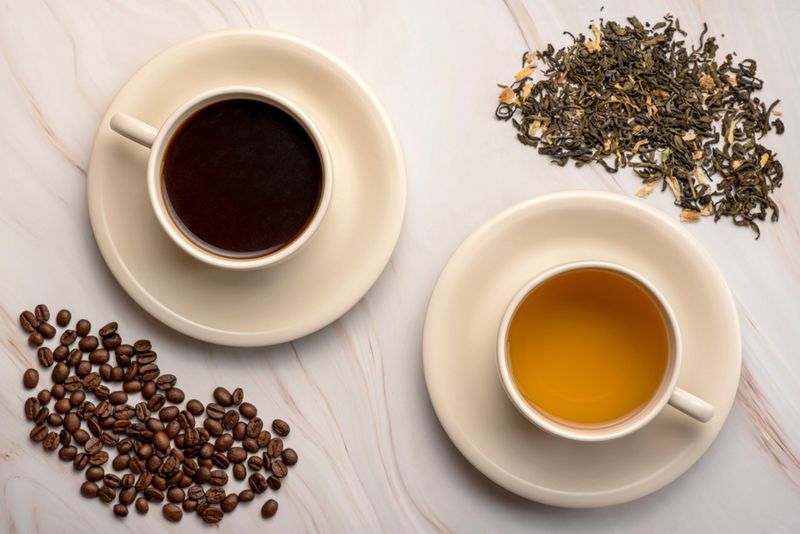
Every morning, millions of people face the same decision: tea or coffee? These two drinks are more than just beverages — they’re a lifestyle. Coffee lovers swear by its energy boost, while tea drinkers enjoy its calm and health benefits.
In this blog, we’ll dive into the great debate of tea vs coffee. From caffeine content to health benefits and flavor, we’ll help you decide which drink might suit your lifestyle best. Whether you’re Team Tea or Team Coffee, you’re sure to learn something new!
Tea
Tea is one of the oldest and most widely consumed beverages in the world. It’s made by steeping the leaves of the Camellia sinensis plant in hot water. There are many types of tea, including green, black, oolong, and white — each with its own flavor, aroma, and health benefits.
Tea is known for its calming effect and is rich in antioxidants like catechins and flavonoids. It contains caffeine, but usually in lower amounts than coffee, making it a gentle energy booster. In many cultures, tea isn’t just a drink — it’s a part of rituals, social gatherings, and even daily meditation.
Coffee
Coffee is a bold and energizing beverage made by brewing roasted coffee beans, which are actually the seeds of the Coffea plant. Known for its rich aroma and strong taste, coffee is a favorite for millions who need a kick-start to their day.
Compared to tea, coffee usually contains more caffeine, which is why it’s often the go-to drink for focus, productivity, and long workdays. It’s also packed with antioxidants and can offer benefits like increased alertness and improved physical performance. From espresso shots to creamy lattes, coffee comes in many forms — each one with a fan base of its own.
Tea vs Coffee: Caffeine Content
| Beverage Type | Serving Size | Average Caffeine Content |
|---|---|---|
| Brewed Coffee | 1 cup (240 ml) | 95–120 mg |
| Espresso | 1 shot (30 ml) | 63–75 mg |
| Instant Coffee | 1 cup (240 ml) | 60–80 mg |
| Black Tea | 1 cup (240 ml) | 40–70 mg |
| Green Tea | 1 cup (240 ml) | 20–45 mg |
| Oolong Tea | 1 cup (240 ml) | 30–50 mg |
| White Tea | 1 cup (240 ml) | 15–30 mg |
| Herbal Tea | 1 cup (240 ml) | 0 mg (usually caffeine-free) |
Coffee generally contains 2 to 3 times more caffeine than Tea.
Tea vs Coffee – Health Benefits
| Benefit Category | Tea | Coffee |
|---|---|---|
| Antioxidants | High (especially in green/white) | High (especially in black coffee) |
| Mental Focus | Moderate (with L-theanine) | Strong (due to higher caffeine) |
| Calming Effect | Yes | No (can cause jitteriness) |
| Digestion Support | Yes (herbal teas) | No (can irritate stomach for some) |
| Heart Health | Supports heart function | Mixed studies, may raise heart rate |
| Brain Protection | Mild impact | Shown to reduce risk of Alzheimer’s |
| Weight Management | Boosts metabolism (green tea) | Increases fat burning (short-term) |
| Physical Energy Boost | Light and steady | Strong and quick |
Tea calms the body, coffee energizes the mind.
Tea vs Coffee – Side Effects
| Side Effect | Tea | Coffee |
|---|---|---|
| Caffeine Overload | Less likely | More likely |
| Sleep Problems | Mild (in sensitive people) | Common (if consumed late) |
| Stomach Irritation | Rare | More common (especially on empty stomach) |
| Iron Absorption | May reduce if overconsumed | Minimal impact |
| Anxiety/Jitters | Uncommon | Common in high doses |
| Withdrawal Symptoms | Mild | Can be stronger |
Too much tea may block iron, too much coffee can cause jitters.
Tea vs Coffee – Taste & Preparation
| Category | Tea | Coffee |
|---|---|---|
| Flavor Profile | Light, floral, earthy | Bold, bitter, roasted |
| Brewing Method | Steeping (tea bag or loose leaves) | Brewing (machine, French press, etc.) |
| Brew Time | 2–5 minutes | 3–10 minutes |
| Common Add-ons | Lemon, honey, milk | Sugar, cream, syrups |
| Variety | Green, black, oolong, herbal | Espresso, latte, cappuccino, etc. |
Tea is light and simple to steep, coffee is bold and brewed with more gear.
Tea vs Coffee: Which One is Better?
When it comes to choosing between tea and coffee, the answer really depends on your lifestyle, taste, and health goals.
If you need a quick energy boost, love rich flavors, and enjoy strong coffeehouse vibes — coffee might be your best friend.
If you prefer a calming drink, want gentle focus, and enjoy light, refreshing flavors — tea could be your go-to choice.
Conclusion
Tea and coffee each bring something unique to the table. From caffeine levels to health benefits, taste, and preparation methods, both drinks offer value depending on your mood and lifestyle. Tea offers a calming, antioxidant-rich, and gentler experience, while coffee delivers a bold flavor and a strong energy kick to start your day. Whether you prefer to sip slowly in the morning or grab a quick boost before work, the choice truly depends on what fits your routine best. And if you’re interested in exploring more health-related topics, don’t forget to check out my other blogs on The Benefits of Vitamin D and Why Vitamin E Matters.
Leave a Reply